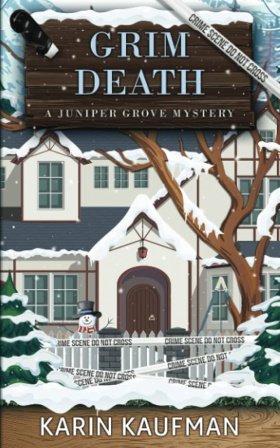“I hope you’ve got plenty of wall space,” Brodie said.
Giving Brodie a slightly crooked yet endearing smile, Charlotte pressed on. “So why did Laura react as if she were seeing something new? Isn’t that what it looked like to the rest of you?”
“That’s what it looked like to me,” Shasta said, leaving the window and sidling up to her husband.
“Has anyone added anything to the painting since the Christmas party?” Charlotte asked.
“Good question,” Brodie said. “You’re thinking like a lawyer.”
Dalton made a face. You’re both fools.
“No one’s laid a finger on it,” Clay said adamantly. “Whatever Laura saw, she’s seen before. Maybe she didn’t feel good—have you considered that? Or maybe she remembered an appointment and had to leave.”
“Saying she can’t stand the company?” Shasta asked.
Resolute in his optimism, Clay went on. “Or it could be she was looking at another painting in here. We have more than a few.”
“Oh for goodness’ sake!” Mary snarled as she wheeled back from the window. “Can we forget paintings and finish our brunch? How about that?”
We stared in stunned silence. Mary had always been cool and calm, but she looked on the verge of tears. Or of tearing something to shreds.
“I’m sorry, everyone.” A smile worked its way into her expression. “I’m worried about Laura. Besides, everything’s getting cold.”
“We can’t let that happen,” Gilroy said. “Clay, how about some more coffee?”
“Absolutely,” Clay said. “I’ve hardly touched mine.”
“I’ve hardly touched my food,” Isak said, taking off for the sunroom.
“Is it awful that I’m still hungry?” Shasta chimed in.
I let Gilroy go ahead of me and stopped Mary before she could pass by. “It’s all lovely. The table, the food. Don’t worry about Laura or anything else.”
“But I am worried, Rachel.”
“About Laura? Whatever’s bothering her, she’ll get over it.”
She shook her head. “No, Dalton’s always been a burr in her saddle, and vice versa. Don’t forget to call me when you get home.”
Before I could follow her to the sunroom, Charlotte pulled me aside and pointed across the living room to another one of Dalton’s oversized works. “That’s the one, Rachel. Check out the lower right part when you get a chance.”
Brodie was hanging about, waiting on Charlotte, but Dalton had left the living room. No time like the present.
I shot across the room and zeroed in on the painting’s lower right quadrant.
Houses and gardens, couples arguing, a car parked on someone’s front lawn, a mailman reading someone’s mail, and there—a house with the name Anderson on its mailbox. And in front of the house a pumpkin patch, a woman lying face-up in that patch, and another woman driving a black-handled knife into the prone woman’s chest.
I was the knife-wielding woman, no question about it. A little overweight, brown hair, wearing jeans, a turtleneck, and hiking boots—my whole shebang. But what sealed my identification was the book at the figure’s feet. It bore the title of my first published mystery, The Banfield Dead.
The detailed vignette reproduced Maureen Nicholson’s murder October before last, with one important difference: I hadn’t killed her. So why had Dalton Taylor made me the villain? For what purpose?
I slipped my phone from my pocket, took a shot of the scene, then took a photo of the whole painting. Before hurrying to the sunroom, I zipped over to the other wall, to the Taylor monstrosity that had disturbed Laura, and took a photo of that for good measure.
“We thought we’d lost you, Mrs. Newlywed,” Dalton said as I retook my seat.
“Not me. Too much good food.” I was itching to exchange verbal blows with him, but for Mary’s sake I turned to making small talk with the Karlsens.
“So Isak, are you still teaching art at Woodland Academy?”
“For now. But it’s a love-hate relationship tending more towards hate these days.” He frowned, reconsidering the question. “I don’t remember telling you I taught art.”
“Someone at the festival told me,” I said. “I don’t remember who.”
“Where would small towns be without gossip?” Brodie asked as he reached for his coffee.
“Where would newspapers be?” Clay said.
“Let’s hear it for the gossip rags,” Dalton said.
“Newspapers aren’t gossip, they’re fact,” Brodie retorted.
At that Mary snapped out of her fog and focused like a laser on Brodie. “Some might disagree.”
“Well, they’d be wrong,” Brodie said, punctuating his argument with a huge bite of his croissant.
“I don’t know about that,” Charlotte said. “Seems to me a lot of gossip passes for news in the Post.”
Brodie’s expression changed, shifting from amused to slightly wounded. “We print verified fact. It may sound like gossip because it’s usually about people, but it’s always fact.” He spoke around his bite of croissant, heedless of the crumbs falling from his lips. “For one thing, there are libel laws. Newspapers have to consider lawsuits.”

























